Statements of the Guiding Scholars of Our Age Regarding Books and their Advice to the Beginner Seeker of Knowledge [softcover]
$27.50
A comprehensive guidebook for the Muslim who wishes to learn about his or her religion with the proper goal and aim, in the proper way, and through the proper books. This compilation includes a detailed list of over 300 books recommended by the scholars for studying Islaam.
Description
Statements of the Guiding Scholars of Our Age Regarding Books
& their Advice to the Beginner Seeker of Knowledge
With Selections from the Following Scholars:
Sheikh ‘Abdul-‘Azeez Ibn ‘Abdullah Ibn Baaz
Sheikh Muhammad Ibn Saaleh al-‘Utheimeen
Sheikh Muhammad Naasiruddeen al-Albaanee
Sheikh Muqbil Ibn Haadee al-Waada’ee
Sheikh ‘Abdur-Rahman Ibn Naaser as-Sa’adee
Sheikh Muhammad ‘Amaan al-Jaamee
Sheikh Muhammad al-‘Ameen ash-Shanqeetee
Sheikh Ahmad Ibn Yahya an-Najmee
(May Allaah have mercy upon them.)
& Sheikh Saaleh al-Fauzaan Ibn ‘Abdullah al-Fauzaan
Sheikh Saaleh Ibn ‘Abdul-‘Azeez Aal-Sheikh
Sheikh Muhammad Ibn ‘Abdul-Wahaab al-Wasaabee
Permanent Committee of Scholastic Research & Issuing of Islamic Rulings
(May Allaah preserve them.)
With an introduction by: Sheikh Muhammad Ibn-’Abdullah al-Imaam
Translated & Compiled by: Abu Sukhailah Khalil Ibn-Abelahyi al-Amreekee
[Available: NOW¦ pages: 300+ ¦ Size: 7.44 x 9.25 soft cover ]
This collection has seven general sections and three appendixes:
The first section: Guidance for Every Male and Female Muslim
The second section: Golden Advice That Benefits the Beginner Regarding Acquiring Knowledge
The third section: Beneficial Guidance for Female Students of Sharee’ah Knowledge
The fourth section: Guidance from the Scholars Regarding Important Books to Acquire for Seeking Knowledge
The fifth section: The Warning of the Scholars from the Books of those who have
Deviated from the Sunnah & Warnings Regarding Ways of Going Astray
The sixth section: Clear Statements from the Advice of the Scholars Regarding Memorizing Knowledge
The seventh section: Issues Related to the Verifiers of Books in our Age
First appendix: Categorized List of Books Recommended within the Scholars’ Statements Gathered in this Work
Second appendix: Index of Questions and Issues Organized by Scholar’s Name
Table of Contents for FIRST TWO SECTIONS OF SEVEN
Images of handwritten original of introduction of Sheikh Muhammad Ibn ‘Abdullah al-Imaam (may Allaah preserve him) ………………………………………………………………………………………………..26
Introduction of Sheikh Muhammad Ibn ‘Abdullah al-Imaam (may Allaah preserve him)……28
Compiler’s Introduction …………………………………………………………………………………………………..30
1. Guidance for Every Male and Female Muslim
(1) Writings of Sheikh Ibn Baaz to Others: To the Youth who are Part of Today’s Revival of Islaam ……………………………………………………………………………………………………….43
(2) Question: The revival of Islaam that we are witnessing: is it simply a reaction to the present societal corruption and far from Allaah’s true way, as some have portrayed it? Or is it based and well-founded upon that which will produce true results, if Allaah wills? ………45
(3) Question: “Islamic revival’ is a term which is common in these days, such that we find it generally used to refer to the increase of religious practice and the people returning back to judging by the Book of Allaah and Sunnah of His Messenger, may Allaah’s praise and salutations be upon him. What do you say concerning this and with what do you advise the youth? ………………….47
(4) Question: There is spreading throughout the Muslim world a blessed Islamic revival which all Muslims welcome and are pleased with. However,we see that this revival does not place sufficient concern and emphasis on the correct understanding of Sharee’ah matters, nor upon the fundamentals of the correct beliefs of Islaam. What is your advice, esteemed scholar, in relation to this revival? ………..48
(5) My Advice to the Youth of the Revival of Islaam ………………………………………………49
(6) Question: What is the correct and sound position to be adopted by the scholar, the student of knowledge, and the caller to Allaah in relation to the modern day groups, parties, and Islamic organizations? ……………………………………………………………………………………55
(7) Examine, may Allaah have mercy upon you, everything you hear from the people of your age. …………57
(8) Proceed with caution, oh you who call to the ‘renewal’ of the religion! ………………….58
(9) Four questions regarding the terms “Islamic thought” and “freedom of thought” The esteemed Sheikh was asked about the correctness of the statement of an individual: “I am free.” ………… 61
(10) The Difference between Knowledge and Speculative Thought ……………………………64
(11) An Explanation of a Tremendous Hadeeth ……………………………………………………68
(12) Regarding Knowledge: its Merits, and which Knowledge is Considered Obligatory ….69
(13) The Important Place of Knowledge within an Individual’s Practice of the Religion …73
(14) The Prophet Sought Refuge from Knowledge which does not Benefit & Knowledge is of Two Types ……..78
(15) The Categories of Knowledge and the Rulings Regarding Them Knowledge is of Two Categories: Beneficial Knowledge and Harmful Knowledge. ………………………………….79
(16) Question: Certainly in these days many associate themselves with calling to Allaah, making it necessary that we know who are truly the recognized people of knowledge; those who are in fact engaged in guiding the Muslim Ummah and its youth upon the true and proper way. Therefore, who are those scholars that you advise the youth to strive to benefit from, to follow and hold to their regular lessons and audio tapes, and to take knowledge from them, and who are those who we should refer to in significant issues, any dilemmas or difficulties that occur, and during times of tribulation and confusion? ………………………..81
(17) Question: What are the Sharee’ah guidelines which enable the Muslim to preserve his adherence to Islaam, to hold closely to the methodology of the first three generations of believers such that he avoids straying from it, and protect him from being influenced by foreign ideologies of misguidance? ……………………………………………………………………..84
(18) Question: May Allaah reward you with good. In Imaam Shaatibee’s book ‘al-Muwaafiqaat’ he has the following statement. He says, “The ruling given by the scholar in relation to the common person who is aware of it, is like or has the similar standing of the evidence which is known to the scholar who is capable of deriving independent rulings from the sources, meaning it must be followed.’ So we need a clarification of this statement. Is the common person sinning if he deliberately differs from the ruling given to him by a leading scholar, just as it is known that a scholar is considered to have transgressed if he contradicts the clear evidence from the sources which he is aware of? ………………………………………86
(19) Question: Indeed, Allaah hears our supplications, may Allaah bless you. A listener from Pakistan says, “Esteemed Sheikh, please inform us about the concept of ‘ijtihaad’, and the concept of ‘taqleed’. What is meant by ‘taqleed’ and what is meant by ‘ijtihaad’? Was the practice of ‘taqleed’ present in the age of the Companions and the generation after them, that of the Successors to the Companions? Did the some of them make ‘taqleed’ of others from among them in Sharee’ah rulings or not?’ ……………………………………………………………89
(20) Question: What is intended by the statements of the scholars of the fundamentals of the religion: “The general person should blindly follow the people of knowledge.” Is the meaning of this that it is obligatory upon the general Muslim to follow one scholar in every one of his rulings, or does it mean something else? I hope for a clarification of this. ………………………..90
(21) I was asked by one of the people of knowledge, “What is my obligation in regard to my behavior with the scholars of Najd? Do they have distinctive merit that is greater than the rest of the believers?” ………………………………………………………………………………………92
(22) Question: Who are those individuals in our land of Saudi Arabia upon the call to follow the methodology of the first three generations of Islaam from whom it is befitting that we seek knowledge at their hands? ……………………………………………………………………………….95
(23) I asked our sheikh for general advice, as well as to inform me of who the guiding scholars of our present time are. …………………………………………………………………………………..95
(24) Question: We would like you to explain the meaning of Allaah’s statement, ﴾Verily those who fear and have reverence of Allaah the most from His worshipers are the scholars﴿ ……99
(25) Regarding the Right of the People of Knowledge ……………………………………………100
(26) Question: What is the description of those scholars whom we should be guided by?……101
(27) Who are the people who truly fear Allaah? …………………………………………………..103
(28) The Way of the People of the Sunnah and the Jama’ah in Relation to Knowledge and Deeds ………………………………………………………………………………………………………105
(29) The Sole Remedy is Returning to the True Religion ………………………………………106
(30) The Reasons for the Weakness of the Muslims in the Face of their Enemies and the Means to Cure This ………………………………………………………………………………………………107
(31) Reasons for the Attainment of Victory ………………………………………………………..109
2. Golden Advice That Benefits the Beginner Regarding Acquiring Knowledge
(32) Question: Should we begin with seeking knowledge or with calling to Allaah? ………….117
(33) Question: What are the guidelines of seeking knowledge and what are the means and ways of seeking it? ……………………………………………………………………………………….119
(34) Question: I ask that you would give us your guiding advice for the beginning students of knowledge. ………………………………………………………………………………………………..121
(35) Question: What is your advice for the beginner in seeking Sharee’ah knowledge? …….122
(36) Question: I want to seek Sharee’ah knowledge and begin studying; however I don’t know how to begin. What do you advise me in this regard? ……………………………………………123
(37) Question: Our esteemed sheikh, may Allaah preserve you, I have a desire to seek Sharee’ah knowledge, and I want for you to clarify to me the correct path for seeking Sharee’ah knowledge- may Allaah reward you with good. …………………………………………………..123
(38) Question: For the beginning student of knowledge, for example in America, what is your advice regarding those books which he should begin with and then those to proceed to step by step? ………………………………………………………………………………………………………..124
(39) Question: With what do you advise the one who wants to seek Sharee’ah knowledge but he lives far away from the scholars, considering however, that he has a collection of books containing both complete books as well as summarized books? ……………………………….126
(40) Question: What is your view of the saying found on the tongues of many students of knowledge that, “The one whose teacher is his book, his errors are greater that which he is correct in”? ………………………………………………………………………………………………..126
(41) Question: With what do you advise the one who begins seeking knowledge when he is older in age? Additionally, if is it not easy for him to take knowledge from and sit often with a scholar, will he benefit from seeking knowledge without a scholar? ………………………127
(42) Question: What is the best way to acquire authentic Sharee’ah knowledge in light of the conditions of the age we find ourselves in? …………………………………………………………128
(43) Question: Briefly, what is the way knowledge is sought, may Allaah reward you with good. ……………………………………………………………………………………………………….129
(44) Question: I am a teacher in an Islamic school, teaching boys between the ages of seven and eleven various studies related to Islaam. What do you advise me to teach them? Also, which are the best books for them in the area of fundamental beliefs? ………………………130
(45) Two Significant Obstacles on the Path to Knowledge ……………………………………..131
(46) Question: I have been seeking knowledge for some time; however I do not see its results upon myself or upon my family except to a small degree. So what is the reason for this, and what is the remedy for this situation? ……………………………………………………………….134
(47) Question: What is best for the students of knowledge: to devote themselves completely to seeking knowledge, and then afterwards fully dedicate themselves to spreading knowledge among the people, inviting their neighbors and those around them to Allaah? Or is it better to seek knowledge for perhaps a month and then to stop studying, due to the need to engage in calling to Allaah and so proceed according to the limits of the knowledge one has acquired?.135
(48) Question: You have mentioned before about the importance of seeking knowledge and devoting oneself to it. Is the meaning of this that the student of knowledge, in doing so, separates himself from the people and from other beneficial endeavors? I hope that you would clarify this, due to the importance of this issue. ……………………………………………………136
(49) Question: In consideration of your experience and your efforts in seeking knowledge- does seeking knowledge, memorizing texts, occupying oneself in the rulings of various issues, researching, and reading, conflict with the endeavor of calling to Allaah? …………………..136
(50) Question: Some people hold the view that it is necessary that efforts of calling to Allaah only be in the masjids. What is your position regarding this? And which environments and methods are acceptable in the issue of calling to Allaah? ………………………………………..137
(51) Question: What is your view regarding the one who explains the statement of the Messenger, may Allaah’s praise and salutations be upon him, “Whoever Allaah intends good for He grants him understanding of the religion”, to mean an understanding of which are the best of actions to spend your time upon, and of those which of them possesses the greatest reward that we should give precedence to over other righteous actions, as they are of greater benefit to us in that specific time? ……………………………………………………………………137
(52) Question: Should the beginning student of knowledge start seeking knowledge by researching various evidences of different issues or by simply following one of the leading scholars of the four well-known established schools of jurisprudence? Our esteemed sheikh, what is your guidance in this matter? May Allaah the exalted preserve you. ……………….139
(53) Question: When there are many issues and various rulings which the student of knowledge must contend, with what is the ideal way for him to correctly comprehend them? ………..140
(54) Question: Esteemed sheikh, I love you for the sake of Allaah and I ask Allaah, the Most Glorified and the Most Exalted,to gather us, you, and all of our Muslim brothers all together in Jannah. To proceed: Esteemed sheikh, we hope to receive from you guiding advice for the youth in this city, as there is between them many differences or divisions, each one saying he is upon the truth; and Allaah knows in reality who is upon the truth. So we hope from you guidance and advice as to how they should specifically proceed in beginning their studies or when initially starting to seek knowledge? …………………………………………………………143
(55) Question: What are those matters within the methodology of the people of the Sunnah and the Jama’ah which it is permissible to differ in, while giving advice to each other remains between us; and which matters is it is not permissible for us to differ in? Is it permissible to differ in regards to the basic correct belief, or with the different issues of belief? In what source work can we find a simple clarification of this? …………………………………………………..145
(56) Question: What is the proper way for the student of knowledge to act in situations where there is a difference of opinion in knowledge-based issues, in order that unity is maintained between our hearts and conflicts are avoided? …………………………………………………….147
(57) Question: Some of the people of knowledge say, “We advise the beginning student to read in the subject of correct beliefs, the book ‘al-Aqeedatul-Wasateeyah’ and in relation to fiqh, or the general understanding of how to practice the religion, to study the works of the school of jurisprudence predominantly found within his country. Therefore if the people of the country follow the Hanbalee school of jurisprudence, then study from the book ‘Zaad al-Mustaqnaa’, and if they follow the Shaafa’ee school of jurisprudence or the Maalikee school of jurisprudence, then study from their relevant books.” So what is the proper way to study the branch of knowledge known as fiqh, and which books do you recommend for its study? Also, which scholar’s statements are primarily based upon the Book and the Sunnah in this field? ……..153
(58) Question: What characteristics should be found within the one whom you wish to take knowledge from? ………………………………………………………………………………………..156
(59) Question: Are audio cassettes considered a method from the methods of acquiring knowledge? And what ways, for example, can we benefit from them? ………………………..157
(60) Question: I am a young man who wants to be a caller to Allaah, but I do not possess the proper manners necessary for this. Is the publishing and distribution of beneficial Islamic books or an Islamic tapes sufficient for this? Please advise me, may Allaah reward you with good. ……………………………………………………………………………………………………….157
(61) Question: What is your general advice to the beginning student of knowledge? Which books and audio lectures, that teach the methodology of the first generations of Muslims, are recommended for them? ………………………………………………………………………………..158
(62) Question: Oh our sheikh, if I have heard from you a response to a specific question directed to you, and at a later time someone asks me this same question. So I answer him knowing that I personally do not possess the knowledge sufficient to answer him, but I answer him based upon your previous answer to this same question or I give the answer of one of the scholars, in doing so have I done anything wrong or sinful? ……………………………………158
(63) The Ideological War: Its Characteristics, Methods and the Required Response to It …..160
(64) Question: Esteemed sheikh, the Muslim Ummah is being targeted by its enemies, such that they charge at us from every direction. The latest evil they have directed towards us- and it is the most dangerous of their evils in my opinion- is what is known as the “internet” which attacks our very households. Indeed, internet cafes have opened which are used by both children as well as young men who are not yet reached maturity. Likewise it has been announced that they will open similar ones for women! So what is your advice for us in how we use the internet? Additionally, what is the ruling regarding opening these internet cafes, when the majority of what we see in them are various types of corruption? May Allaah benefit us through you. …………………………………………………………………………………177
(65) Question: What is the Islamic ruling on the use of the television if we have Islamic dialogues with the Christians, and knowledge based lectures that are specifically educational or cultural? ……………………………………………………………………………………………….179
(66) Question: What is the Islamic ruling on reading daily newspapers, publications, or magazines for the purpose of getting societal, Islamic, governmental, or cultural news in order to understand what is going on around us? ………………………………………………. 180
(67) Question: Some of those who call to Allaah avoid utilizing various types of media because of their rejection of any government controlled newspaper or reject working a magazine which generally relies upon sensational articles to increase their circulation among the people. So what is your esteemed view regarding this? …………………………………………………..181
(68) Question: Clearly, bringing guidance to the people is the result of spreading Sharee’ah knowledge among them, however we see that falsehood is more widely spread over most newspapers and the various types of media, as well as within the education methodologies and curriculums. So what is the position of the scholar and the caller to Allah regarding this? ….182
(69) Question: The youth involved in the revival of Islaam are commonly accused of extremism and “fundamentalism” in some of the various media sources. What is your esteemed view of this? ………………………………………………………………………………………………………..184
(70) Question: It is well know how much good the Islamic recording distributors have accomplished in the present time and their important role in guiding the people. However some people of evil intent attempt to distort the reputation and state that they are only engaged in making money and other statements that malign them. I hope that, esteemed sheikh, your would clarify this important issue for the people, to protect them from the deceptions of the ones who don’t have insight into matters. ………………………………………………………….185
(71) Question: Lastly, what is your advice to us as to how to seek knowledge? Also which books and tapes are needed by the beginning student of knowledge? ………………………………….186
(72) Question: Many youth have abandoned reading the books of the first three generations of Muslims and thus correcting their beliefs by them. By this what is meant is such books ‘as-Sunnah’ of Ibn Abee ‘Aasim, as well as other similar books which explain the methodology and position of the people of the Sunnah and the Jam’aah in relation to the Messenger’s Sunnah and those who adhere to it, and in relation to the ways of innovation and their people. They have become occupied with reading works of those known as “thinkers” or “callers”, those who have in their statements that which contradicts and opposes the contents of books of our Salaf. What is your advice for these youth? Also, which are the books of the methodology of the first generations of Muslims which you advise them to read in order to correctly build their beliefs upon or correct their beliefs by? …………………………………….187
(73) Question: What is your esteemed view of the one who avoids reading the books of the modern day callers, holding that to restrict themselves to the books of the first three generations is preferred, and so they take their methodology from such books? So is this perspective correct, or is combining the books of the first three generations, may Allaah have mercy upon them, along with the books of modern day callers and thinkers or writers? …………………………189
(74) Question: Does an individual have an excuse for neglecting the seeking of knowledge because they are busy with educational studies which are not related to Sharee’ah knowledge, or due to having to work, or because of other reasons? …………………………………………..190
(75) Question: Is it permissible for someone to leave working in order to devote himself to seeking knowledge, thus becoming a burden upon his father and his brother? ……………190
(76) Question: Some people say to the students of knowledge, “You are idle without work.” So what should our reply to this be? ………………………………………………………………..192
(77) Question: If a student of knowledge receives discouragement regarding his efforts from his family, his wife, and some of his close relatives, what will assist him in shielding himself from this? …………………………………………………………………………………………………194
(78) Question: What is the ruling regarding the one who does not obey his mother in the issue of seeking knowledge if she will not give him permission to go to another land to seek knowledge? Is he considered from those who have fallen into a major sin as someone who behaved badly toward his parents? Or is he from those who are rewarded for his seeking knowledge even thought he disobeyed his mother in conformance with the statement of the Messenger (upon him be good mention and peace), “There is no obedience to the creation in disobedience to the creator.”? …………………………………………………………………………197
(79) Question: Which of them has precedence: going forth in seeking knowledge or going forth for jihaad? Additionally, is it required to get permission from your parents in both situations? …………………………………………………………………………………………………198
(80) Question: How should the student of knowledge behave towards his parent who attempts to prevent him from seeking knowledge? …………………………………………………………..199
(81) Question: Why is it not a condition to get permission from your parents when going to seek knowledge, but required when going for jihaad? Isn’t there a distinction in this, that if they have a need for you that you do not go for knowledge, and if they do not have a need for you then you may go seek knowledge? ……………………………………………………………199
(82) Seeking Knowledge and Jihaad in Path of Allaah ………………………………………….200
(83) Question: The statement has spread among the students of knowledge especially in the colleges and institutions of knowledge that: [Knowledge has left with the passing of the people of knowledge, and those who now study in the institutions of knowledge do so only for the purpose of obtaining degrees or the benefitting in this world]. So what is the response to them? Additionally, what is the ruling of combining the intention for a worldly benefit or receiving a diploma along with one’s intention to seek knowledge to benefit oneself and one’s society? …201
(84) Question: We have noticed that in the present day the number of Sharee’ah universities, colleges, and institutes, and similar places of learning have spread. However along with this increase, we see that they are not able to produce scholars similar the those who came forth during the previous ages from the circles of learning in the masjids. This is in relation to their ability in regard to knowledge or in regard to their ability to discuss and debate matters. So what are the reasons for this? …………………………………………………………………………203
(85) Question: Is it permissible for the proficient student of knowledge to declare someone a person of innovation or to declare that someone has abandoned Islam, or is this a matter exclusively for the scholars? Second question: Is it for the beginning student of knowledge to put forth criticism or praise regarding individuals, or to declare people to be innovators in the religion without relying upon evidence? ……………………………………………………….204
(86) Question: Some of the minor students of knowledge have busied themselves with speech regarding the people of division and group partisanship towards their group, and have made that the focus of the majority of their time, thus neglecting knowledge- the opportunity to seek knowledge which will benefit them with their Lord and to seek knowledge which would explain and distinguish for them those matters which are hated and despised from those matters that are desired and good. They say that this is so that they understand the errors of the people of these groups of partisanship. However, it has come about that nothing has the level of importance to them as the asking: “What is your opinion of so-and-so, and what is your position regarding so-and-so?” Likewise, it has reached the point where the majority of their sittings are regarding these matters, and they have begun to accuse the people haphazardly. What is your advice to these youth, and your encouragement to them to give concern to that Sharee’ah knowledge which will protect them from innovation in the religion? ……………204
(87) Question: Esteemed sheikh, may Allaah preserve you, we hope that you would give advice to your sons from among the students of knowledge who live in Abu Dhabee and the United Arab Emirates as a whole. …………………………………………………………………..205
(88) Question: What do you say regarding the student of knowledge authoring works early on in his studies? Is it true that this sharpens the intellect of the student of knowledge? …….206
(89) Question: I am a beginning student of the efforts to seek knowledge, and presently I am come close to the time for my vacation as generally known. And I hope that Allaah will grant me success in utilizing and taking full advantage of it. So I hope to receive from you, esteemed sheikh, an explanation and discussion of some of the guidelines that will assist me in accomplishing that. ………………………………………………………………………………….208
(90) Question: Oh Abu ‘Abdur-Rahman, we need for you to inform us how you organize your time in seeking knowledge. When do you do your research, when do you teach your brothers, and how many lessons do you have during a day and a night? And we ask Allaah for sincerity of intention for you and for ourselves ……………………………………………….214
(91) The Personality of the Student of Knowledge and Attending Lessons ………………….216
(92) Question: What are the proper manners for the scholar and the student to acquire and be molded by? …………………………………………………………………………………………….219
(93) A Basic Summary of the Behavior and Manners of Scholars and Students ………….222
(94) Question: Certainly, there is a need for the student of knowledge to learn the well known excellent manners that are enjoined by the Sharee’ah. So esteemed sheikh, if only you would counsel us as to what is proper for the student of knowledge to strive to achieve in relation to humbleness and the aspects of forbearance of character. ………………………………………..225
(95) These are from the Distinguishing Signs of Beneficial Knowledge ………………………229
Questions 96-183 Are not included in the above list due to space
Only logged in customers who have purchased this product may leave a review.



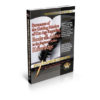


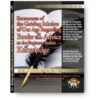
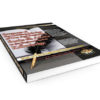
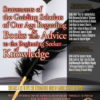

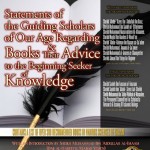
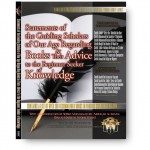
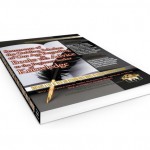

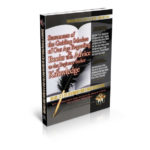

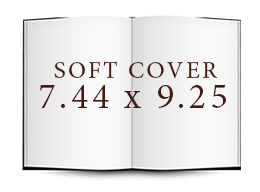
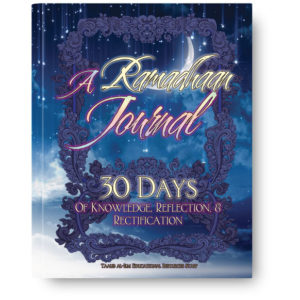
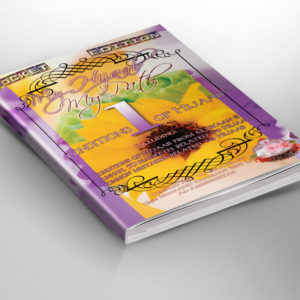
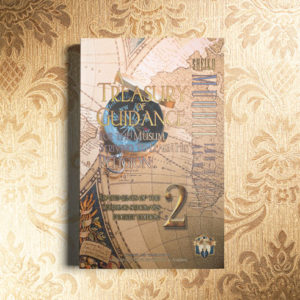
![Foundations For The New Muslim & Newly Striving Muslim [Self-Study Teacher's Edition]- A Short Journey through Selected Questions with Sh. Ibn Baaz](https://taalib.com/wp-content/uploads/2017/01/30DFOU-2booksdisplay-booksigning-300x300.jpg)
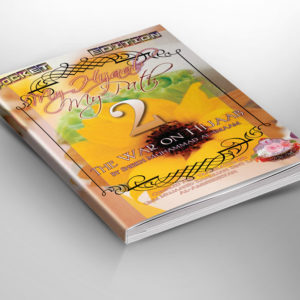
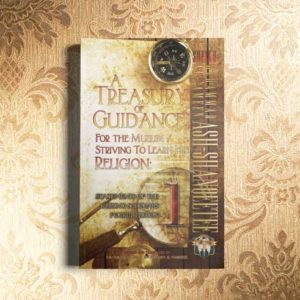
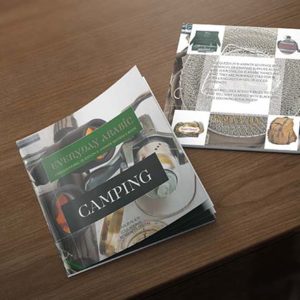
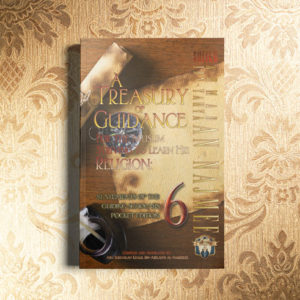
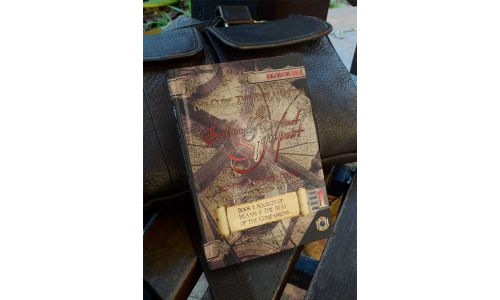
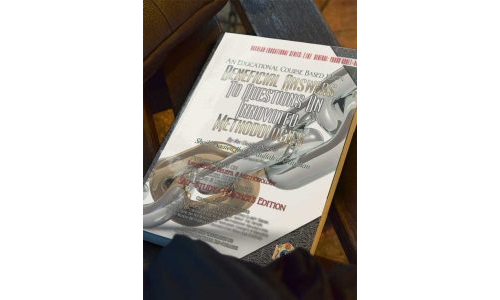
![30 Days of Guidance: Signposts Towards Rectification & Repentance - [Book 3] Preview](https://taalib.com/wp-content/uploads/wpdm-cache/1book-whereisyourlife-1024-500x300.jpg)

Reviews
There are no reviews yet.